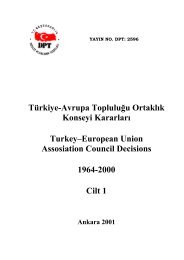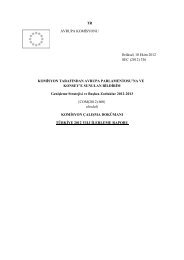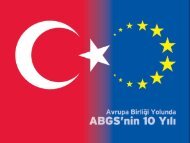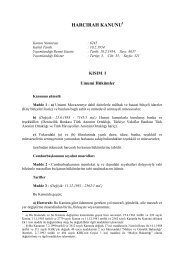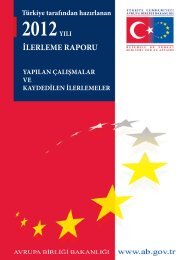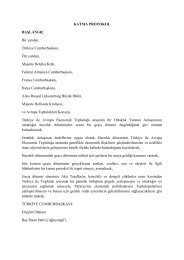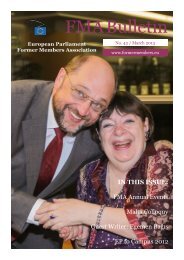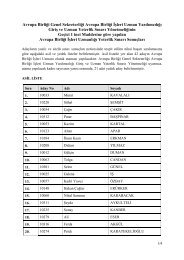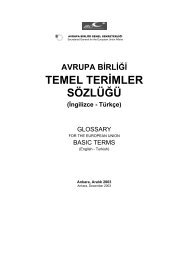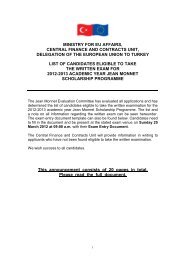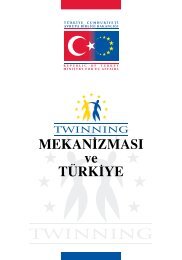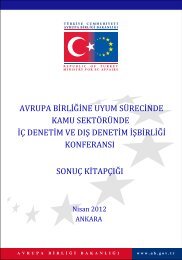2010 ilerleme raporu - Avrupa BirliÄi BakanlıÄı
2010 ilerleme raporu - Avrupa BirliÄi BakanlıÄı
2010 ilerleme raporu - Avrupa BirliÄi BakanlıÄı
Create successful ePaper yourself
Turn your PDF publications into a flip-book with our unique Google optimized e-Paper software.
Enlargement needs to remain credible for all involved. Aspirant countries and their citizens<br />
need a clear perspective of accession, once conditions are met, and should see tangible<br />
benefits along the way. Member States and EU public opinion must be sure that new<br />
accessions are prepared well through rigorous conditionality. Making a success of<br />
enlargement requires the firm political commitment of all stakeholders. The renewed<br />
consensus on enlargement, agreed by the December 2006 European Council, remains the<br />
framework for achieving these objectives. This policy is based on the principles of<br />
consolidation of commitments, fair and rigorous conditionality and good communication with<br />
the public, combined with the EU’s capacity to integrate new members.<br />
The enlargement process provides mechanisms and incentives, culminating in membership,<br />
that encourage enlargement countries to work together with the EU in realising common<br />
objectives. As economic governance within the EU is reinforced, economic dialogue with the<br />
enlargement countries will also be intensified, enabling us to focus together on putting the<br />
crisis behind us and creating jobs. The EU's global competitiveness gains from closer<br />
integration with countries that have a number of comparative advantages. This is one of the<br />
lasting benefits of the fifth enlargement, which brought the EU from 15 to 27 Member States<br />
between 2004 and 2007. Trade between 'old' and 'new' Member States tripled from around<br />
€150 billion to €450 billion during the decade leading to 2008. The enlargement process has<br />
provided the financial means for the EU to step in, together with the international financial<br />
institutions, to maintain economic stability in times of crisis, where necessary. Small and<br />
medium sized enterprises, which generate two out of three private sector jobs in the EU and<br />
are a major stimulus for innovation, benefit from an enlarged internal market and are an<br />
important focus for pre-accession assistance.<br />
Closer integration through the enlargement process helps the EU to achieve its objectives in a<br />
number of areas which are key to economic recovery and sustainable growth, including<br />
energy, transport, the protection of the environment and efforts to address climate change.<br />
The countries of the Western Balkans are entirely surrounded by Member States. Turkey<br />
adjoins the European Union by land and sea. The construction of trans-European transport<br />
corridors, the diversification of energy sources, the mitigation of and adaptation to climate<br />
change and the reduction of trans-boundary air and water pollution are among the EU's goals<br />
whose achievement requires the full commitment of the enlargement countries.<br />
They, too, benefit from progress in such areas; the accession perspective provides them with<br />
incentives to give priority to goals shared with the EU. Grants from the Instrument for Pre-<br />
Accession Assistance (IPA) and loans from the European Investment Bank and other<br />
international financial institutions, which IPA helps to leverage, provide practical means of<br />
support. The most recent candidate which has begun accession negotiations, Iceland, is a<br />
world leader in various forms of renewable energy and has much to contribute to EU<br />
innovation efforts in this and other advanced fields.<br />
Making Europe a safer place is high on the EU's agenda as defined in the Stockholm<br />
Programme. Enlargement countries are required to take over the acquis of the Union and to<br />
demonstrate their capacity to implement it fully. For this reason, the Commission has<br />
redoubled efforts to support enlargement countries to prevent and tackle organised crime and<br />
corruption and to strengthen their law enforcement capabilities. EU prosecutors, judges and<br />
other experts in law enforcement, border management and migration now assist counter-parts<br />
EN<br />
3<br />
EN




